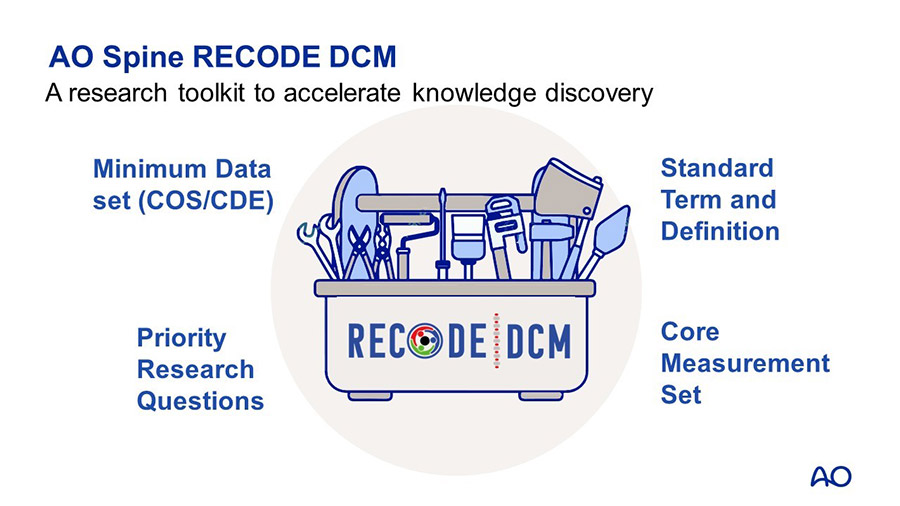AO Spine RECODE-DCM: New research toolkit to advance Degenerative Cervical Myelopathy research and patient care

The AO Spine Knowledge Forum Spinal Cord Injury (KF SCI) has created a toolkit to equip the spine community—including AO Spine faculty who conduct research or teach on this topic—with tools they need to make DCM studies robust, comparable, and focused on the most relevant open questions. This landmark study titled, REsearch Objectives and COmmon Data Elements for Degenerative Cervical Myelopathy (RECODE-DCM), will change the way DCM research is carried out and thus advance patient care. Therefore, it is of utmost importance to disseminate this knowledge.
The collaborative AO Spine RECODE-DCM initiative was executed with Myelopathy.org to standardize and synergize researchers' work for faster and more efficient global progress. The newly established index term and definition, in combination with the top ten priorities and the minimum data set, can accelerate research findings and improve outcomes that matter most to all stakeholders. Created by the AO Spine Knowledge Forum Spinal Cord Injury (KF SCI), the toolkit contains:
- The index term and definition: From the many different terms that have been used to name this condition, the international community selected Degenerative Cervical Myelopathy (DCM). A definition of the condition can be registered in international disease classifications.
- The top ten research priorities: These include the most important questions for researchers to tackle and what they should focus on to address problems that matter most to people living with, treating, or otherwise affected by DCM
- The minimum dataset: These data points will ensure researchers measure consistent data points across the globe. The measurement includes minimum core data elements, core outcome set, and the tools to measure the outcomes without burdening the researchers and patients.
It is paramount that spine surgeon educators are aware of the prevalence of DCM and that they consistently use the term DCM in AO Spine teaching and course naming, now that there is a consensus, investigators said.
AO Spine RECODE-DCM principal investigator Mark Kotter pointed out that DCM is the number one cause of chronic spinal cord injury in adults. In order to advance patient outcomes, it is essential to find answers to the top ten research priorities.
"We need to take it seriously. It is much more prevalent than we thought,” he said.
KF SCI Advisory Board member Michael Fehlings warned that the estimated 2 percent of people over 40 years with a DCM diagnosis is just the tip of the iceberg, particularly in the aging population.
“In many people, it can just creep up on them, and it can result in very significant impairment,” he explained.
Research—and the new toolkit—can make a difference, according to AO Spine RECODE-DCM co-principal investigator Benjamin Davies.
“This new toolkit tells you, as a minimum, what should be in your battery of tests when you’re conducting your research,” he said. “With the current [low] levels of funding for DCM and the many knowledge gaps that were identified, efficiency is necessary."
DCM is an under-researched condition, and AO Spine aims to inspire a new generation of spine researchers to coalesce around the AO Spine RECODE-DCM initiative and implement the standardized terminology and research toolkit. Stimulation of research activity will attract more capital by giving funding bodies confidence that the studies they support are robust, reliable, and relevant to the entire DCM community. Please help disseminate this knowledge through courses, webinars, and conferences to the broader community.

